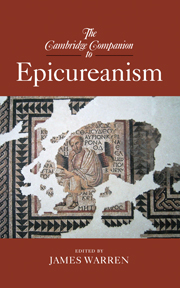Book contents
- Frontmatter
- Introduction
- 1 The Athenian Garden
- 2 Epicureanism in the Roman Republic
- 3 Epicureanism in the Roman Empire
- 4 Epicurean atomism
- 5 Epicurean empiricism
- 6 Cosmology and meteorology
- 7 Psychology
- 8 Action and responsibility
- 9 Pleasure and desire
- 10 Politics and society
- 11 Epicurean philosophy of language
- 12 Philosophia and technē: Epicureans on the arts
- 13 Removing fear
- 14 Epicurean therapeutic strategies
- 15 Epicureanism in early modern philosophy
- Bibliography
- Index
1 - The Athenian Garden
Published online by Cambridge University Press: 28 September 2009
- Frontmatter
- Introduction
- 1 The Athenian Garden
- 2 Epicureanism in the Roman Republic
- 3 Epicureanism in the Roman Empire
- 4 Epicurean atomism
- 5 Epicurean empiricism
- 6 Cosmology and meteorology
- 7 Psychology
- 8 Action and responsibility
- 9 Pleasure and desire
- 10 Politics and society
- 11 Epicurean philosophy of language
- 12 Philosophia and technē: Epicureans on the arts
- 13 Removing fear
- 14 Epicurean therapeutic strategies
- 15 Epicureanism in early modern philosophy
- Bibliography
- Index
Summary
“Fair Quiet, I have found you here” / “Mistaken long, I sought you then / In busie Companies of Men. / Your sacred Plants, if here below, / Only among the Plants will grow. / Society is all but rude, / To this delicious Solitude.” Andrew Marvell, The Garden / Epicurus' Garden was once located outside the walls of Athens and its Dipylon Gate. It has come to seem a metaphor for the retiring and non-political character of his philosophy. According to Seneca, who thought that Epicurus secluded himself outside Athens to avoid notice, there was an inscription at the entrance to his suburban garden. It read: 'Stranger, your time will be pleasant here. Here the highest good is pleasure.' (In Seneca's Latin: hospes hic bene manebis hic summum bonum voluptas est, Ep. 79.15.) Epicurus' Garden would seem to be the prototype of Rabelais' Abbaye de Thélème. The inscription must be an invention, but it stands in pointed contrast to the inscription that led into the garden and groves of Plato's Academy, which was also located outside the walls of Athens: 'Let no one unversed in geometry enter here.' In his move to Athens from the Greek East in 307/306 BC Epicurus acquired this garden located not far from Plato's Academy. The sum seems large: 80 minae (or 8,000 drachmae, DL 10.10), but his sworn enemy Timocrates of Lampsacus claimed that he spent a mina a day on food (DL 10.7).
- Type
- Chapter
- Information
- The Cambridge Companion to Epicureanism , pp. 9 - 28Publisher: Cambridge University PressPrint publication year: 2009
- 53
- Cited by

